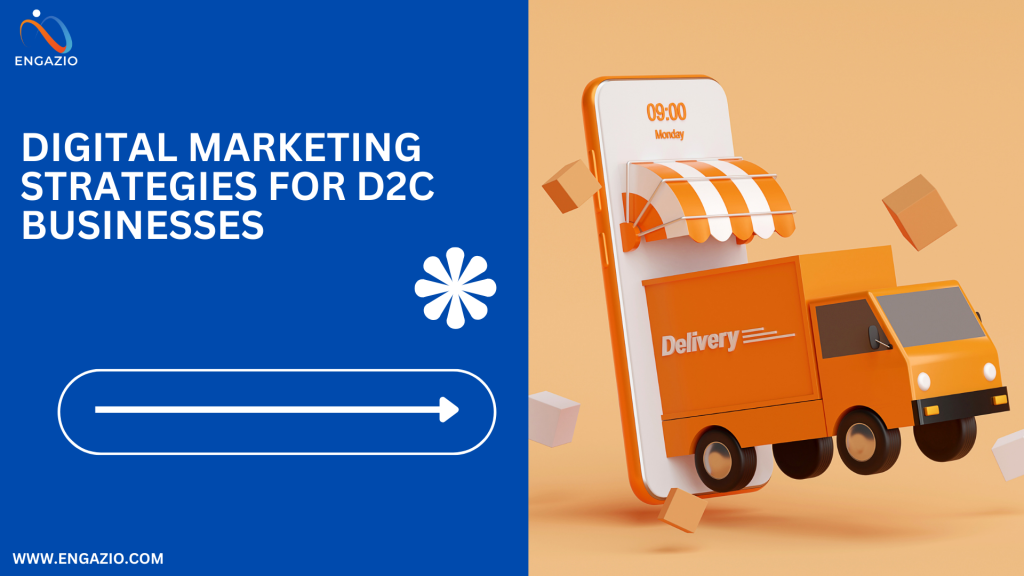In the ever-evolving world of e-commerce, Direct-to-Consumer (D2C) brands have emerged as a game-changer. These brands bypass traditional retail channels to sell directly to their customers, leveraging digital platforms to build strong, personal connections. But to truly succeed in this competitive landscape, D2C brands need a robust digital marketing strategy that drives growth, builds customer loyalty, and ensures long-term sustainability. Here’s a comprehensive guide to crafting an effective digital marketing strategy for D2C brands.
1. Build a Strong Brand Identity
For D2C brands, the first step to standing out in a crowded market is establishing a strong, distinct brand identity. This goes beyond a logo and color scheme—it’s about crafting a brand story that resonates with your target audience.
- Storytelling: Share your brand’s journey, values, and mission. Why do you exist, and how do you make a difference in your customers’ lives?
- Visual Consistency: Ensure that your website, social media, and marketing materials all maintain consistent visual elements to enhance brand recall.
- Customer-Centric Approach: Prioritize the needs and desires of your audience in your messaging. Show them that you’re not just selling products but offering solutions to their problems.
2. Leverage Social Media Marketing
Social media platforms are a goldmine for D2C brands. They offer direct access to consumers and allow brands to engage with them on a personal level.
- Platform Selection: Focus on platforms where your target audience spends the most time. For D2C brands, Instagram, TikTok, and Facebook are popular due to their visual and interactive nature.
- Influencer Partnerships: Collaborating with influencers who align with your brand can expand your reach and add authenticity to your marketing efforts.
- User-Generated Content: Encourage customers to share their experiences with your products. Showcase real customers in your campaigns to build trust and community.
3. Invest in Performance Marketing
To scale effectively, D2C brands need to invest in performance marketing campaigns that drive measurable results. This includes paid advertising on platforms like Google, Facebook, and Instagram.
- Pay-Per-Click (PPC) Advertising: Target keywords and audiences relevant to your products to drive traffic and sales.
- Retargeting Campaigns: Capture the attention of customers who have visited your site but didn’t make a purchase by showing them relevant ads across various platforms.
- Conversion Optimization: Continuously analyze and optimize your ad performance, landing pages, and checkout process to maximize conversion rates.
4. Email Marketing: The Power of Personalization
Email marketing remains one of the most effective tools for D2C brands to engage with their customers. By segmenting your audience and personalizing your messages, you can drive higher engagement and sales.
- Segment Your Audience: Group customers based on their behavior, preferences, and purchase history to send more relevant and timely emails.
- Automated Campaigns: Use automation to send personalized welcome emails, abandoned cart reminders, and product recommendations.
- Offer Value: Instead of constantly promoting products, offer value through helpful tips, exclusive offers, or behind-the-scenes content.
5. Focus on SEO and Content Marketing
A strong content marketing strategy can significantly enhance your brand’s visibility, credibility, and customer trust.
- Blogging: Publish articles that address your customers’ pain points, answer common questions, and provide useful insights related to your industry.
- Search Engine Optimization (SEO): Optimize your website and content for search engines by targeting relevant keywords, improving site speed, and ensuring a seamless user experience.
- Video Content: Leverage video marketing, from product demos to customer testimonials, to engage your audience and build deeper connections.
6. Utilize Data and Analytics
For a D2C brand, data is key to understanding customer behavior and optimizing marketing efforts. Using data-driven insights, you can improve targeting, refine campaigns, and drive better results.
- Customer Journey Mapping: Analyze how customers interact with your brand across various touchpoints and use this information to improve their experience.
- A/B Testing: Continuously test different ad creatives, landing pages, and email campaigns to identify what resonates best with your audience.
- Customer Feedback: Gather feedback through surveys, reviews, and social listening to gain a deeper understanding of your customers’ preferences.
7. Enhance the Customer Experience
The customer experience is at the heart of any D2C strategy. Since D2C brands handle every touchpoint of the customer journey, they must ensure it’s seamless and enjoyable.
- Personalized Experiences: From website customization to tailored product recommendations, aim to create a shopping experience that feels unique to each customer.
- Customer Support: Provide exceptional support through multiple channels like chatbots, social media, and email. Fast and helpful responses can turn first-time buyers into loyal customers.
- Loyalty Programs: Implement a loyalty or rewards program to incentivize repeat purchases and increase customer lifetime value.
8. Build a Community
One of the most powerful strategies for D2C brands is creating a sense of community around their products. A loyal customer base that feels connected to the brand is more likely to share, recommend, and advocate for the brand.
- Engage on Social Media: Regularly interact with your audience through comments, DMs, and interactive content like polls and quizzes.
- Exclusive Offers for Members: Offer your community early access to products, special discounts, or behind-the-scenes content.
- Host Virtual Events: Create online events, webinars, or Q&A sessions that allow customers to engage with the brand and other community members.
Conclusion
D2C brands have the unique opportunity to connect directly with their customers, but they also face the challenge of cutting through the noise in a competitive digital space. By building a strong brand identity, leveraging social media, investing in performance marketing, and focusing on personalized experiences, D2C brands can develop a digital marketing strategy that drives long-term growth and customer loyalty. The key is to stay agile, data-driven, and deeply connected to your audience’s needs.



